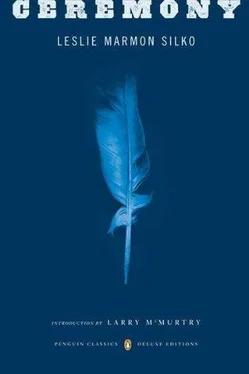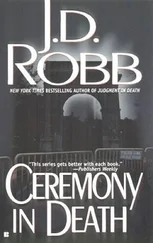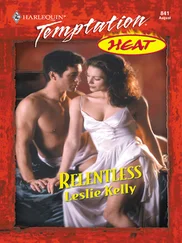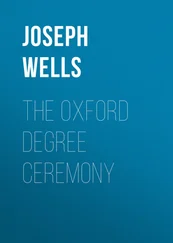“Good-bye,” he said. He pushed the screen door open, into the cool damp air outside. “Good-bye, Tayo. Thank you for bringing the message.”
He left Harley holding a bottle of Coors in both hands, talking to himself. He walked west. He could see the peaks of Mount Taylor high above everything, high above the valley. The thin winter snow was already gone from the high peaks, and the sacred mountain was a dusty, dry blue color. He could feel the heat from the ground through his boots, and shimmering waves of heat dance around him from the pavement, making him shaky, as though he were walking in a strong wind. The trucks and cars that went speeding past him made ripples in the heavy blanket of heat, but the air that circulated was only slightly cooler.
The old Mexican man brought him a bowl of menudo. They were alone in the little café. Tayo could see through the narrow kitchen to the back door, which was propped open with a chair so that cool air could find its way in and the hot air could leave by the front door, which was also open. On both screen doors the flies sat rubbing their legs together, waiting to get inside. The old man sat on a stool by the front door with a red rubber fly swatter in his right hand, watching them. Occasionally he glanced up at the low plaster ceiling, where a half dozen shiny yellow fly ribbons were hanging like party decorations. The ribbons were speckled with dead flies and a few that made feeble attempts to pull loose. He paid the old man and left, opening the screen door only enough to squeeze out and closing it quickly so that no flies got in. The sun was behind the hills southwest of McCartys by then, and he walked with the long shadows back to the bar to find Harley. He was thinking about the time when he was young and swatting flies in the kitchen with a willow switch because it was fun to chase them, not the serious business that the old Mexican man had made fly killing. Anyway, Josiah had come in from outside and he asked Tayo what he was doing, and Tayo had pointed proudly to a pile of dead flies on the kitchen floor. Josiah looked at them and shook his head.
“But our teacher said so. She said they are bad and carry sickness.”
“Well, I didn’t go to school much, so I don’t know about that but you see, long time ago, way back in the time immemorial, the mother of the people got angry at them for the way they were behaving. For all she cared, they could go to hell — starve to death. The animals disappeared, the plants disappeared, and no rain came for a long time. It was the greenbottle fly who went to her, asking forgiveness for the people. Since that time the people have been grateful for what the fly did for us.”
Tayo let the willow switch slide out of his hand. He stared at it on the floor by his feet. “What will happen now?” he asked in a choked voice.
“I think it will be okay,” Josiah said, poking at the dead flies with the toe of his boot. “None of them were greenbottle flies — only some of his cousins. People make mistakes. The flies know that. That’s how the greenbottle fly first came around anyway. To help the people who had made some mistakes.” He hugged the boy close. “Next time, just remember the story.”
But in the jungle he had not been able to endure the flies that had crawled over Rocky; they had enraged him. He had cursed their sticky feet and wet mouths, and when he could reach them he had smashed them between his hands.
Harley wasn’t there. The Mexican bartender had gone home, and now the white man who owned the place was behind the bar, dusting off the bottles with a rag. Tayo stood in the door and looked around inside, at the empty tables with crooked legs of different lengths. Someone had swept the floor, and the beer bottles and cigarette butts were piled high in the middle next to the broom leaning against the back of a chair. The stale bar air followed him out the door — smelling like old cigarette smoke and spilled beer. He stood outside facing the south, but all his feelings were focused behind him, northeast, in the direction of Cubero. He turned around. The yellow sandstone outcrop ran parallel to the big arroyo behind the bar. All he had to do was follow it. He walked to Cubero in the twilight, looking up occasionally at the mountain, where the peaks were caught in the sunset. It was warm. Over on the highway he could see headlights and taillights moving east and west, but he felt alone, as if that world were distant from him. No traffic came along the dirt road, and it was quiet except for the crickets in the rocks and a few evening insects buzzing past his face; in the distance dogs were barking. The store in Cubero was closed, and the gas pumps had locks on the handles. Somewhere he smelled chili cooking for supper. The road past the store was empty except for an old cow with a broken horn hanging near her face. He didn’t have to turn around to see the sunset.
The reflection of its colors made the sandstone cliffs bright gold, and then deep red. He sat on the steps of the long porch and looked at the adobe walls for a long time. Years of rain and wind had weathered away the adobe plaster, exposing the symmetry of the brown adobes which were beginning to lose their square shape, taking on the softer contours of the mesas and hills.
He remembered sitting this way, on these steps with Rocky, while Josiah went inside Lalo’s to get cold beer and bottles of soda pop for them. Lalo had retired during the war. He had sold the liquor license and closed the bar. But it had changed very little. The circular stairs were still there, at the end of the long porch. They had been cut from heavy oak planks, and they spiraled around the massive center timber like the small bones of a spine held in place by thick wooden pegs. Years of hands on the railing and feet on the steps had left the wood polished smooth and bone gray. The big tree was dying. Thick limbs at its center were brittle and white. One of the remaining live limbs brushed against the porch railing at the top of the stairs. He smelled the waxy dark green leaves, and remembered climbing the big cottonwood trees along the river and plucking heavy hanging bunches of cottonwood berries that grew on the female trees late in the summer. They had carried home armloads of the seed pods, the size of peas, full of fluffy cotton when they split open. The smell of the crushed leaves had been exciting then because the cottonwood berries were ammunition to use against the other boys from the village, who tucked their shirttails into their jeans and filled the inside of the shirts with cottonwood berries until they had pendulous bellies. Then they ran, laughing and throwing handfuls of the green berries at one another.
The cottonwood trees had not lost their familiar feeling with him. They had always been there with the people but they were much more than summer shade. After hundreds of years, when the great trees finally got too old and dry, the Ka’t’sina carvers from the villages came searching for them to cut pieces of their soft dry wood to carve.
He sat down on the upstairs porch with his back against the adobe wall and closed his eyes. In a world of crickets and wind and cottonwood trees he was almost alive again; he was visible. The green waves of dead faces and the screams of the dying that had echoed in his head were buried. The sickness had receded into a shadow behind him, something he saw only out of the corners of his eyes, over his shoulder.
The place felt good; he leaned back against the wall until its surface pushed against his backbone solidly. He picked up a fragment of fallen plaster and drew dusty white stripes across the backs of his hands, the way ceremonial dancers sometimes did, except they used white clay, and not old plaster. It was soothing to rub the dust over his hands; he rubbed it carefully across his light brown skin, the stark white gypsum dust making a spotted pattern, and then he knew why it was done by the dancers: it connected them to the earth.
Читать дальше












